Unit 9 Learning Lesson 2 Language Learning Tips课件(共29张)2024-2025学年高一英语北师版(2019)必修第三册
文档属性
| 名称 | Unit 9 Learning Lesson 2 Language Learning Tips课件(共29张)2024-2025学年高一英语北师版(2019)必修第三册 |
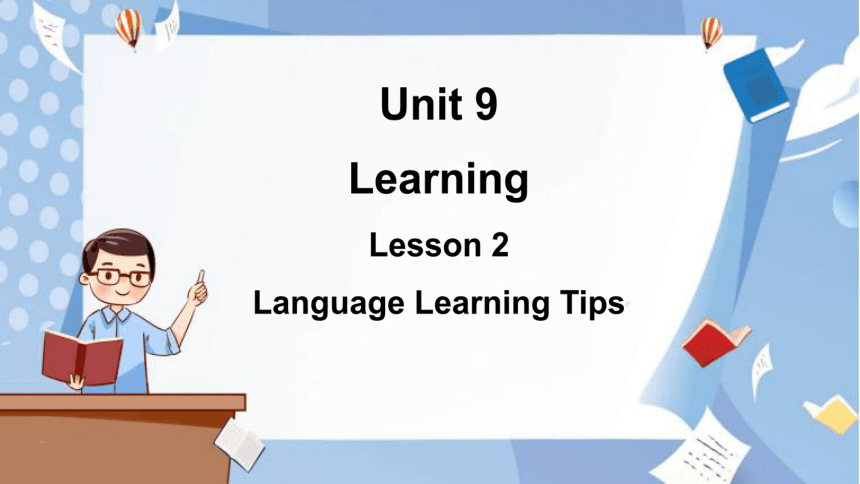
|
|
| 格式 | pptx | ||
| 文件大小 | 4.7MB | ||
| 资源类型 | 教案 | ||
| 版本资源 | 北师大版(2019) | ||
| 科目 | 英语 | ||
| 更新时间 | 2025-04-29 21:31:01 | ||
图片预览

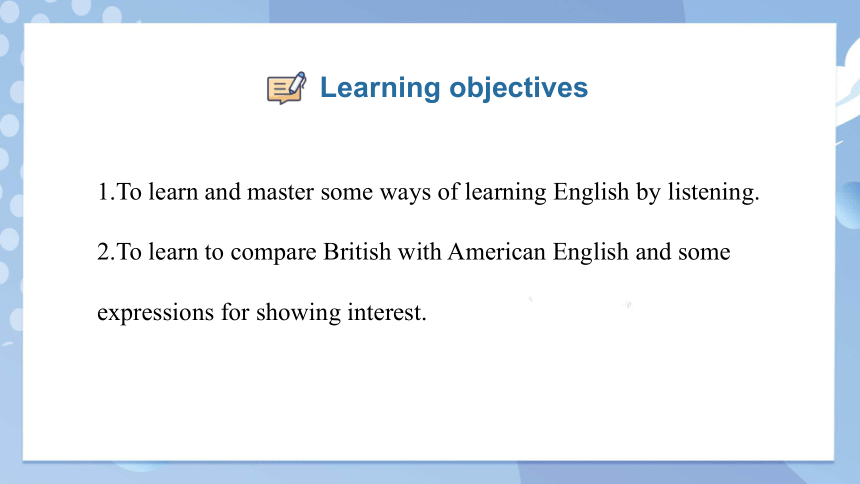
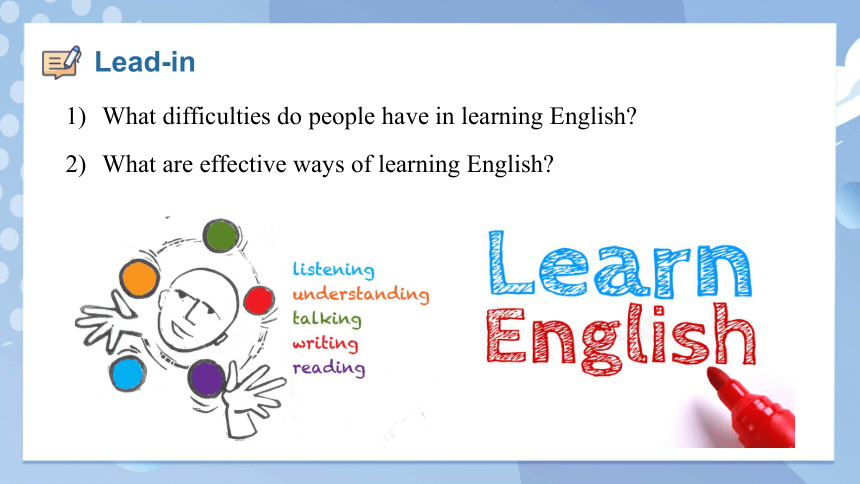
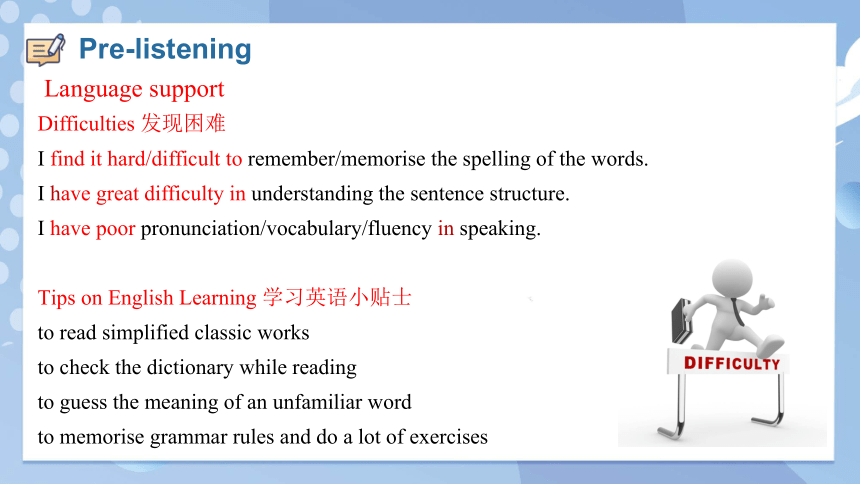

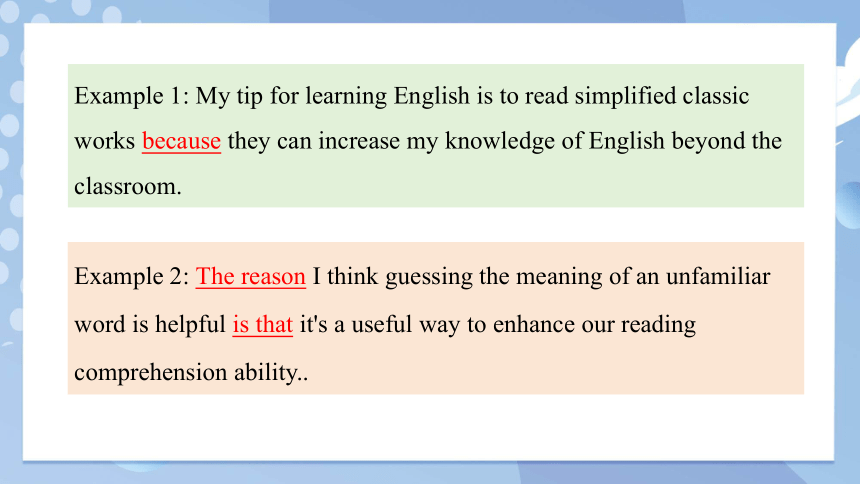
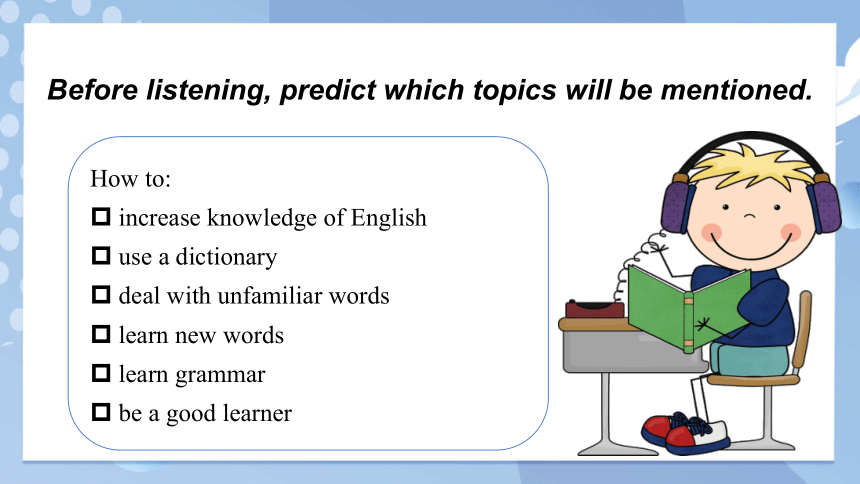
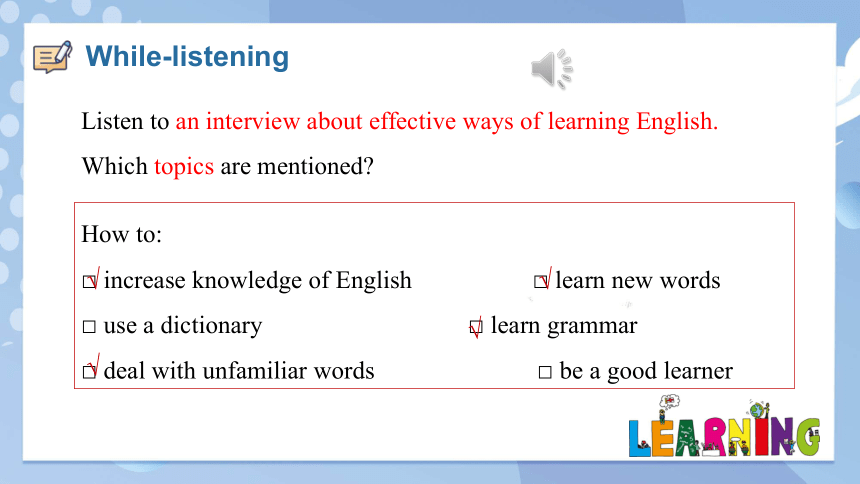
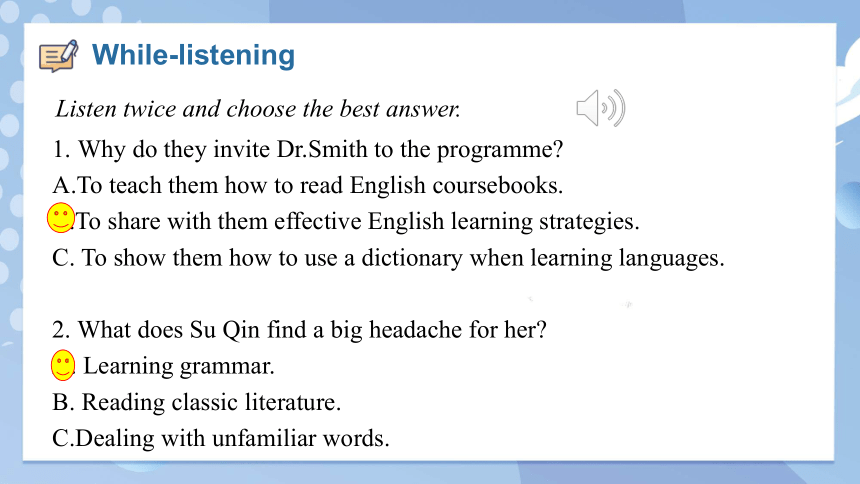
文档简介
(共29张PPT)
Unit 9
Learning
Lesson 2
Language Learning Tips
1.To learn and master some ways of learning English by listening.
2.To learn to compare British with American English and some expressions for showing interest.
Learning objectives
What difficulties do people have in learning English
What are effective ways of learning English
Lead-in
Language support
Difficulties 发现困难
I find it hard/difficult to remember/memorise the spelling of the words.
I have great difficulty in understanding the sentence structure.
I have poor pronunciation/vocabulary/fluency in speaking.
Tips on English Learning 学习英语小贴士
to read simplified classic works
to check the dictionary while reading
to guess the meaning of an unfamiliar word
to memorise grammar rules and do a lot of exercises
Pre-listening
Activate and Share
What tips do you know about learning English Give reasons for each of your tips.
to read simplified classic works
to check the dictionary while reading
to guess the meaning of an unfamiliar word
to memorise grammar rules and do a lot of exercises
…
adj. 简单化的
adj. 不熟悉的
v. 记忆
Example 1: My tip for learning English is to read simplified classic works because they can increase my knowledge of English beyond the classroom.
Example 2: The reason I think guessing the meaning of an unfamiliar word is helpful is that it's a useful way to enhance our reading comprehension ability..
Before listening, predict which topics will be mentioned.
How to:
increase knowledge of English
use a dictionary
deal with unfamiliar words
learn new words
learn grammar
be a good learner
Listen to an interview about effective ways of learning English. Which topics are mentioned
How to:
□ increase knowledge of English □ learn new words
□ use a dictionary □ learn grammar
□ deal with unfamiliar words □ be a good learner
√
√
√
√
While-listening
Listen twice and choose the best answer.
1. Why do they invite Dr.Smith to the programme
A.To teach them how to read English coursebooks.
B.To share with them effective English learning strategies.
C. To show them how to use a dictionary when learning languages.
2. What does Su Qin find a big headache for her
A. Learning grammar.
B. Reading classic literature.
C.Dealing with unfamiliar words.
While-listening
I: Welcome to today’s programme. We’ve invited Dr. Smith to share with us _________ strategies for learning English. Hello, Dr. Smith, many of our listeners have questions about learning English. I suppose you’re ready to take ______ from our listeners. So start phoning in!
Listen and complete the missing information.
effective
calls
Listen for understanding
C1: Hello, Dr. Smith. I’ve spent a lot of time reading English
____________, but I’ve made little ________. My questions is how to learn English effectively.
DS: Well, my advice is to ________________________ of English beyond the classroom. One way to do that is by reading more. I would ___________ that you try _________ classic literature, such as short stories and novels rewritten in simple English. The other way is to listen more, for example, listening to English programmes. With sufficient _____________, I’m sure you can learn English effectively.
Y: Hello, Dr. Smith. My name is Yang An. I find ___________ new words very difficult.
increase your knowledge
recommend
simplified
language input
coursebooks
progress
memorising
Listen for understanding
DS: Hi, Yang An. So what do you ________ do to memorise new words
Y: I just try to memorise the ________ and it is so difficult and _______.
DS: Well, I don’t think memorising the word list is the best way to learn words. First, you should learn words in context. For example, when reading English stories, try to _______________ even when you ______ ______ some new words. A lot of the time, you’ll be able to ______ the meaning of an __________ word without looking it up. Also, you should learn words in chunks. For example, we say “open the book”, but “turn on the computer”. Or we say “eat an apple”, but “take the medicine”.
Y: OK. I see. So I need to learn words in context and in chunks. Thank you very much.
normally
word list
boring
keep reading on
come
guess
unfamiliar
across
Listen for understanding
S: Hello, Dr. Smith. I’m Su Qin. Learning _________ is a big headache for me. I’ve put so much time in memorising grammar ______ and doing a lot of exercises, but my English is still really bad.
DS: Hi, Su Qin. Just memorising the rules is ___________. My advice is that when you learn a grammar rule, you should try to use it in speaking and writing activities. By doing so, you’ll be learning grammar _______ ________________ than from a grammar book. Very slowly, you will start to ________ the rules and use them _________________.
S: Ah! I’ll try this and see how it goes. Thank you very much.
I: Thank you, Dr. Smith, for joining us today. I’m sure our audience has better ideas about how to learn English effectively now.
grammar
rules
not helpful
in a
acquire
without thinking
more natural way
Listen for understanding
Listen again. Complete the missing information.
1 What is Dr. Smith’s advice on effective English learning
Dr. Smith’s advice is to ____________________ of English beyond the classroom. One way to do that is _________________. He recommends that you try ___________________________. The other way is to ____________.
increase your knowledge
by reading more
simplified classic literature
listen more
While-listening
2 What is his suggestion on learning words
Firstly, you should ______________________. A lot of the time, you’ll be able to __________________ of an unfamiliar word without ____________.
Also, you should learn _________________. For example, we say “open the book”, but “turn on the computer”.
learn words in context
guess the meaning
looking it up
words in chunks
While-listening
3 What advice does he give on learning grammar
Just memorising the rules is ___________. His advice is that when you learn a grammar rule, you should try to use it in ___________________________. By doing so, you’ll be learning grammar in a more natural way than from a grammar book.
not helpful
speaking and writing activities
While-listening
Do you find Dr. Smith’s advice helpful Why
What are other ways to learn English vocabulary and grammar effectively
Writing and rewriting can be helpful.
Translating can also be helpful.
Watching movies and TV series and dubbing.
dubbing 配音
translate 翻译
writing 写作
Post-listening
Listen and plete the sentences in the Talk Builder.
Showing Interest (1)
1.—We have different ways of pronouncing words. For example,...
—That's odd! ________________________ ! Do they still mean the same thing
2.—I say “example” and “dancing in the class”, but Robert...
—__________ ! How do people...
3. —We say “lift”, but Americans say “elevator”.
—____________!
4. —The American “subway” is called the “underground” in the UK, or the “tube” in London.
—_________! I never realised...
They sound so different
Ah
Interesting
Wow
Can you add more expressions for showing interest
While-reading
Do you know the differences between British and American English (e.g. spelling, pronunciation, vocabulary, etc.) Give some examples.
Speaking
colour-color, biscuit-cookie, summarise-summarize
Q1: What's the difference in each pair
Q2: Identify which is British English and which is American English
Listen to the plete the notes in the table. What differences between British and American English are mentioned List the examples.
Aspects Examples
ways of pronouncing words water, tomato,
example,
dancing in the classroom
uses of words
lift(英) / elevator(美),
football(英) / soccer(美),
underground (tube)(英) / subway(美)
While-listening
1.I would recommend that you try simplified classic literature,such as short stories and novels rewritten in simple English.(Page 108)
我会建议你尝试一些简化了的经典文学作品,像是用简易英语重新写的短篇故事和小说。
★recommend vt.推荐;建议
【合作探究】
阅读下列句子,写出句中的黑体词组和含义
①Students are recommended to read the following books.
词组 ________________________ 含义 ___________________
recommend sb to do sth
推荐某人做某事
②I recommended meeting him first.
词组 ______________________ 含义 ____________________
③I recommended this book to anyone with an interest in art.
词组__________________ 含义 ____________________
说一说·勤归纳
recommend sb sth=recommend sth to sb 向某人推荐某物
recommend doing sth 建议做某事
recommend sb to do sth 建议某人做某事
recommend that...should do... 建议……应该做……
recommend doing sth
建议做某事
recommend sth to sb
向某人推荐某物
【即学即用】
单句语法填空
①The doctor recommended me (take) a long rest.
②He recommended (read) the book before seeing the movie.
③When I arrived there,he recommended a new hotel me.
一句多译
他们建议每年把机器检修一下。
④They recommended that _______________________________ every year.
⑤They recommended every year.
the machines should be checked
checking the machines
to take
reading
to
2. deal with unfamiliar words(Page 56)解决生词
unfamiliar用作形容词,意为“不熟悉的,不了解的”。
She grew many wonderful plants that were unfamiliar to me.
她种了很多我不熟悉的奇妙植物。
【词汇拓展】
familiar adj.熟悉的
sb be familiar/unfamiliar with sth某人熟悉/不熟悉某物
sth be familiar/unfamiliar to sb某人对某物熟悉/不熟悉
It was a relief to be back in familiar surroundings.
回到熟悉的环境里让人松了一口气。
I am familiar with his style of design.= His style of design is familiar to me.我很熟悉他的设计风格。
3.Today,we’re honoured to have two special guests with us to tell us about this.
今天,我们很荣幸邀请到两位特别的嘉宾来为我们讲述这事。
be honoured to do sth是固定用法,意为“很荣幸做某事”。
I was deeply honoured to be playing against the former champion.
能与前冠军比赛,我很荣幸。
【词汇拓展】
honour n. 尊敬;荣幸 v.尊敬;给予表扬
in honour of 为了纪念;为了表示敬意
It’s a great honour to do sth. 做某事感到荣幸。
honour sb with sth 用某物向某人表示尊敬;授予某人某种荣誉
It’s a great honour to be invited here today.
今天承蒙邀请至此,深感荣幸。
Act out a dialogue between an expert and a learner talking about differences between British and American English.
Homework
Unit 9
Learning
Lesson 2
Language Learning Tips
1.To learn and master some ways of learning English by listening.
2.To learn to compare British with American English and some expressions for showing interest.
Learning objectives
What difficulties do people have in learning English
What are effective ways of learning English
Lead-in
Language support
Difficulties 发现困难
I find it hard/difficult to remember/memorise the spelling of the words.
I have great difficulty in understanding the sentence structure.
I have poor pronunciation/vocabulary/fluency in speaking.
Tips on English Learning 学习英语小贴士
to read simplified classic works
to check the dictionary while reading
to guess the meaning of an unfamiliar word
to memorise grammar rules and do a lot of exercises
Pre-listening
Activate and Share
What tips do you know about learning English Give reasons for each of your tips.
to read simplified classic works
to check the dictionary while reading
to guess the meaning of an unfamiliar word
to memorise grammar rules and do a lot of exercises
…
adj. 简单化的
adj. 不熟悉的
v. 记忆
Example 1: My tip for learning English is to read simplified classic works because they can increase my knowledge of English beyond the classroom.
Example 2: The reason I think guessing the meaning of an unfamiliar word is helpful is that it's a useful way to enhance our reading comprehension ability..
Before listening, predict which topics will be mentioned.
How to:
increase knowledge of English
use a dictionary
deal with unfamiliar words
learn new words
learn grammar
be a good learner
Listen to an interview about effective ways of learning English. Which topics are mentioned
How to:
□ increase knowledge of English □ learn new words
□ use a dictionary □ learn grammar
□ deal with unfamiliar words □ be a good learner
√
√
√
√
While-listening
Listen twice and choose the best answer.
1. Why do they invite Dr.Smith to the programme
A.To teach them how to read English coursebooks.
B.To share with them effective English learning strategies.
C. To show them how to use a dictionary when learning languages.
2. What does Su Qin find a big headache for her
A. Learning grammar.
B. Reading classic literature.
C.Dealing with unfamiliar words.
While-listening
I: Welcome to today’s programme. We’ve invited Dr. Smith to share with us _________ strategies for learning English. Hello, Dr. Smith, many of our listeners have questions about learning English. I suppose you’re ready to take ______ from our listeners. So start phoning in!
Listen and complete the missing information.
effective
calls
Listen for understanding
C1: Hello, Dr. Smith. I’ve spent a lot of time reading English
____________, but I’ve made little ________. My questions is how to learn English effectively.
DS: Well, my advice is to ________________________ of English beyond the classroom. One way to do that is by reading more. I would ___________ that you try _________ classic literature, such as short stories and novels rewritten in simple English. The other way is to listen more, for example, listening to English programmes. With sufficient _____________, I’m sure you can learn English effectively.
Y: Hello, Dr. Smith. My name is Yang An. I find ___________ new words very difficult.
increase your knowledge
recommend
simplified
language input
coursebooks
progress
memorising
Listen for understanding
DS: Hi, Yang An. So what do you ________ do to memorise new words
Y: I just try to memorise the ________ and it is so difficult and _______.
DS: Well, I don’t think memorising the word list is the best way to learn words. First, you should learn words in context. For example, when reading English stories, try to _______________ even when you ______ ______ some new words. A lot of the time, you’ll be able to ______ the meaning of an __________ word without looking it up. Also, you should learn words in chunks. For example, we say “open the book”, but “turn on the computer”. Or we say “eat an apple”, but “take the medicine”.
Y: OK. I see. So I need to learn words in context and in chunks. Thank you very much.
normally
word list
boring
keep reading on
come
guess
unfamiliar
across
Listen for understanding
S: Hello, Dr. Smith. I’m Su Qin. Learning _________ is a big headache for me. I’ve put so much time in memorising grammar ______ and doing a lot of exercises, but my English is still really bad.
DS: Hi, Su Qin. Just memorising the rules is ___________. My advice is that when you learn a grammar rule, you should try to use it in speaking and writing activities. By doing so, you’ll be learning grammar _______ ________________ than from a grammar book. Very slowly, you will start to ________ the rules and use them _________________.
S: Ah! I’ll try this and see how it goes. Thank you very much.
I: Thank you, Dr. Smith, for joining us today. I’m sure our audience has better ideas about how to learn English effectively now.
grammar
rules
not helpful
in a
acquire
without thinking
more natural way
Listen for understanding
Listen again. Complete the missing information.
1 What is Dr. Smith’s advice on effective English learning
Dr. Smith’s advice is to ____________________ of English beyond the classroom. One way to do that is _________________. He recommends that you try ___________________________. The other way is to ____________.
increase your knowledge
by reading more
simplified classic literature
listen more
While-listening
2 What is his suggestion on learning words
Firstly, you should ______________________. A lot of the time, you’ll be able to __________________ of an unfamiliar word without ____________.
Also, you should learn _________________. For example, we say “open the book”, but “turn on the computer”.
learn words in context
guess the meaning
looking it up
words in chunks
While-listening
3 What advice does he give on learning grammar
Just memorising the rules is ___________. His advice is that when you learn a grammar rule, you should try to use it in ___________________________. By doing so, you’ll be learning grammar in a more natural way than from a grammar book.
not helpful
speaking and writing activities
While-listening
Do you find Dr. Smith’s advice helpful Why
What are other ways to learn English vocabulary and grammar effectively
Writing and rewriting can be helpful.
Translating can also be helpful.
Watching movies and TV series and dubbing.
dubbing 配音
translate 翻译
writing 写作
Post-listening
Listen and plete the sentences in the Talk Builder.
Showing Interest (1)
1.—We have different ways of pronouncing words. For example,...
—That's odd! ________________________ ! Do they still mean the same thing
2.—I say “example” and “dancing in the class”, but Robert...
—__________ ! How do people...
3. —We say “lift”, but Americans say “elevator”.
—____________!
4. —The American “subway” is called the “underground” in the UK, or the “tube” in London.
—_________! I never realised...
They sound so different
Ah
Interesting
Wow
Can you add more expressions for showing interest
While-reading
Do you know the differences between British and American English (e.g. spelling, pronunciation, vocabulary, etc.) Give some examples.
Speaking
colour-color, biscuit-cookie, summarise-summarize
Q1: What's the difference in each pair
Q2: Identify which is British English and which is American English
Listen to the plete the notes in the table. What differences between British and American English are mentioned List the examples.
Aspects Examples
ways of pronouncing words water, tomato,
example,
dancing in the classroom
uses of words
lift(英) / elevator(美),
football(英) / soccer(美),
underground (tube)(英) / subway(美)
While-listening
1.I would recommend that you try simplified classic literature,such as short stories and novels rewritten in simple English.(Page 108)
我会建议你尝试一些简化了的经典文学作品,像是用简易英语重新写的短篇故事和小说。
★recommend vt.推荐;建议
【合作探究】
阅读下列句子,写出句中的黑体词组和含义
①Students are recommended to read the following books.
词组 ________________________ 含义 ___________________
recommend sb to do sth
推荐某人做某事
②I recommended meeting him first.
词组 ______________________ 含义 ____________________
③I recommended this book to anyone with an interest in art.
词组__________________ 含义 ____________________
说一说·勤归纳
recommend sb sth=recommend sth to sb 向某人推荐某物
recommend doing sth 建议做某事
recommend sb to do sth 建议某人做某事
recommend that...should do... 建议……应该做……
recommend doing sth
建议做某事
recommend sth to sb
向某人推荐某物
【即学即用】
单句语法填空
①The doctor recommended me (take) a long rest.
②He recommended (read) the book before seeing the movie.
③When I arrived there,he recommended a new hotel me.
一句多译
他们建议每年把机器检修一下。
④They recommended that _______________________________ every year.
⑤They recommended every year.
the machines should be checked
checking the machines
to take
reading
to
2. deal with unfamiliar words(Page 56)解决生词
unfamiliar用作形容词,意为“不熟悉的,不了解的”。
She grew many wonderful plants that were unfamiliar to me.
她种了很多我不熟悉的奇妙植物。
【词汇拓展】
familiar adj.熟悉的
sb be familiar/unfamiliar with sth某人熟悉/不熟悉某物
sth be familiar/unfamiliar to sb某人对某物熟悉/不熟悉
It was a relief to be back in familiar surroundings.
回到熟悉的环境里让人松了一口气。
I am familiar with his style of design.= His style of design is familiar to me.我很熟悉他的设计风格。
3.Today,we’re honoured to have two special guests with us to tell us about this.
今天,我们很荣幸邀请到两位特别的嘉宾来为我们讲述这事。
be honoured to do sth是固定用法,意为“很荣幸做某事”。
I was deeply honoured to be playing against the former champion.
能与前冠军比赛,我很荣幸。
【词汇拓展】
honour n. 尊敬;荣幸 v.尊敬;给予表扬
in honour of 为了纪念;为了表示敬意
It’s a great honour to do sth. 做某事感到荣幸。
honour sb with sth 用某物向某人表示尊敬;授予某人某种荣誉
It’s a great honour to be invited here today.
今天承蒙邀请至此,深感荣幸。
Act out a dialogue between an expert and a learner talking about differences between British and American English.
Homework
同课章节目录
- Unit 7 Art
- Lesson 1 Masterpieces
- Lesson 2 Beijing Opera
- Lesson 3 A Musical Genius
- Unit 8 Green living
- Lesson 1 Roots and Shoots
- Lesson 2 Greening the Desert
- Lesson 3 "White Bikes" on the Road
- Unit 9 Learning
- Lesson 1 Active Learning
- Lesson 2 Language Learning Tips
- Lesson 3 The Secrets of Your Memory
